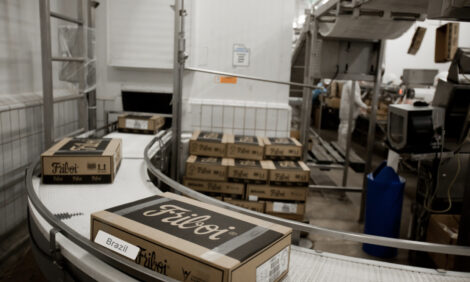



Tyson Sees Record Sales
US - Tyson Foods saw record sales of $33 billion in 2012 despite a drop of $31 million in the fourth quarter of the year.The US poultry and meat processing giant had a net income of $576 million down from $733 million in 2011.
"Our earnings for the fourth quarter and fiscal year indicate that Tyson Foods is rising above the noise of commodity markets to produce solid, more consistent results," said Donnie Smith, Tyson's president and chief executive officer.
"It has taken us several years and a lot of work to get to this point, and although there is much more to be done, I believe we have reached a new level of sustainable performance.
"While fiscal 2012 wasn't a record EPS year, I think it was our best year - certainly our best effort to date. Our team members didn't make excuses; they made a difference, and they made money.
"This allowed us to buy back stock throughout the year, including $50 million in the fourth quarter, and to reinvest in our business at a record level while strengthening our balance sheet.
"Our strong balance sheet, liquidity position and a desire to return cash to shareholders led the Board of Directors to declare a special dividend and to increase the regular dividend by 25 per cent. The Board's action is reflective of our increased profitability and the investments we've made in the company.
"Our accomplishments, reinvestment in our business and record sales in fiscal 2012 were achieved in difficult market conditions. Fiscal 2013 is likely to be equally if not more difficult, but there will always be challenging circumstances in this business.
"It's our job to accelerate growth by focusing on innovation, serving our customers and developing our team members, whatever the market conditions may be. While we're proud of what we've accomplished, we now have higher expectations, and maintaining the status quo is not an option. We will adapt, we will evolve and we will grow."
Mr Smith said the company's continued capital investment in our businesses, strong liquidity and reduced interest expense has put Tyson in a strong position for 2013.
The drought conditions in the summer of 2012 reduced grain supplies, which will result in higher input costs as well as increased costs for cattle and hog producers.
USDA data indicates in fiscal 2013 overall domestic protein production (chicken, beef, pork and turkey) is expected to decrease two per cent compared to fiscal 2012, which should continue to support improved pricing.
In the chicken section. current USDA data shows US chicken production will be down slightly in fiscal 2013.
Due to the reduced crop supply, Tyson expects higher grain costs in fiscal 2013 compared to fiscal 2012 of approximately $600 million. However, the capital investment and significant operational, mix and pricing improvements the company has made in its Chicken segment have better positioned the company to adapt to rising grain prices.
For fiscal 2013, Tyson anticipates the Chicken segment will remain profitable, but could be below the normalized range of 5.0 per cent-7.0 per cent.
In beef, Tyson expects to see a reduction of industry fed cattle supplies of two to three per cent in fiscal 2013 as compared to fiscal 2012.
"Although we generally expect adequate supplies in regions we operate our plants, there may be periods of imbalance of fed cattle supply and demand. We anticipate beef exports will remain st," said Mr Smith.
In the pork sector, Tyson expects industry hog supplies in fiscal 2013 to be flat compared to fiscal 2012 and pork exports to remain strong.
"For fiscal 2013, we believe our Pork segment will be in or above our normalized range of 6.0 per cent-8.0 per cent," said Mr Smith.
In Prepared Foods, Tyson expects operational improvements and increased pricing to offset increased raw material costs.
"Because many of our sales contracts are formula based or shorter-term in nature, we are typically able to offset rising input costs through increased pricing. For fiscal 2013, we believe our Prepared Foods segment will remain in its normalized range of 4.0 per cent-6.0 per cent," Mr Smith added.
The company expects sales in fiscal 2013 sales to increase to approximately $35 billion mostly resulting from price increases related to decreases in domestic availability of protein and rising raw material costs.
The decrease in sales volumes in the fourth quarter and 12 months of fiscal 2012 was largely due to the impact of domestic production cuts the company made in late fiscal 2011 and maintained throughout fiscal 2012, in order to balance supply with forecasted customer demand.
For the 12 months, these production cuts reduced total domestic slaughter pounds by approximately four per cent. The decrease in domestic slaughter pounds was partially offset by increases in international sales volumes and open-market meat purchases.









